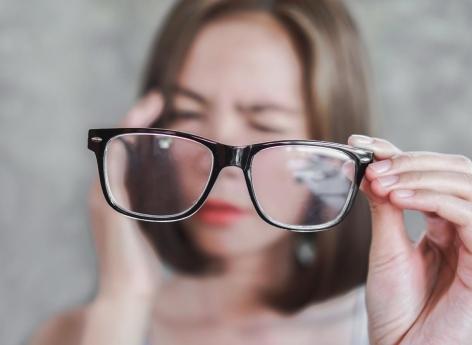primary
- The study found that people who are nearsighted tend to fall asleep later and get less quality sleep.
- According to the researchers, this lack of sleep is caused by altered circadian rhythms and decreased melatonin production.
- The use of screens is widely highlighted: by emitting blue light, they delay sleep and are also responsible for the sharp rise in cases of myopia among young people.
Nearsighted people are more likely to sleep poorly at night than people with clear near vision. This is the conclusion reached by researchers at Flinders University in Australia. at A study published in the journal asleepThey associate sleep disturbance with the development of myopia. According to them, people with myopia sleep less due to Shifting circadian rhythms and decreased production of melatonin, a hormone secreted in the brain and responsible for regulating sleep at night.
Asynchronous circadian rhythms
Disruptions in circadian rhythms and sleep due to the arrival of artificial light and the use of light-emitting electronic devices for reading and entertainment have become a well-known health problem in many areas, but their impact on eye health has not been thoroughly studied. Dr. Ranjay Chakraborty, an optometrist at the Caring Futures Institute at Flinders University explains. These findings provide important evidence that optimal sleep and circadian rhythms are not only essential for overall health, but also for good vision.”
To determine the link between myopia and poor sleep, researchers measured circadian rhythm and melatonin production in people with myopia, as well as in people with normal eyesight. All participants were college students in their twenties.
According to Dr. Chakraborty, melatonin levels in the participants were measured using samples of saliva and urine, and the myopic youth showed significantly delayed circadian rhythms and lower melatonin production compared to participants with normal vision.
Screens are responsible for short-sightedness and poor sleep
Myopia is a vision disorder that results in a blurry distance and sharp close-up vision. This condition occurs due to excessive elongation of the eye during childhood. As a result, light rays enter the eye and are focused in front of the retina rather than directly on it, resulting in blurring.
Myopia usually occurs in children around puberty It appears at any age since childhood. according to A study published in the journal ophthalmology In 2016, the prevalence of myopia in 2000 was 22.9% of the world’s population. It will be 50% in 2050. The question, according to researchers: Overuse of screens, This enhances the appearance of myopia. Hence the need to reduce children’s exposure to screens in order to reduce the risk of developing myopia during their youth. “Adequate sleep is essential for children’s learning, memory, sustained attention, academic performance, and general well-being during their early development.”, confirms Dr. Chakraborty, who remembers it “Many digital devices emit blue light, which can suppress melatonin production and delay circadian rhythms at night, causing delayed and poor sleep.”.

“Subtly charming problem solver. Extreme tv enthusiast. Web scholar. Evil beer expert. Music nerd. Food junkie.”

